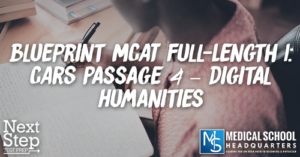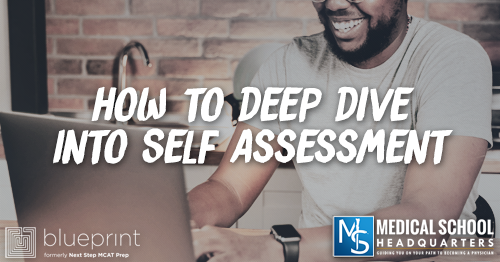Apple Podcasts | Google Podcasts
Session 200
This week, we dive into an abstract CARS passage on “close reading” vs “distant reading,” the new field of the Digital Humanities, and “yacking” vs “hacking.”
Once again, we’re breaking down Blueprint MCAT’s full-length 1 which you can get for free at medicalschoolhq.net/bpfree. If you would like to follow along on YouTube, go to premed.tv.
Listen to this podcast episode with the player above, or keep reading for the highlights and takeaway points.
[02:11] Passage 4 (Questions 19 – 23)
Paragraph 1
“Close reading is a methodological mainstay of the humanities, but what if it didn’t have to be that way? The alternative paradigm of distant reading, most famously advocated for by scholars working at Stanford’s Literary Lab, posits that humanists can apply digital analytics at scale to texts to extract insights that would not be possible using traditional methodologies.”
Notes: The sentence structure seems a little bit tricky. It’s a little bit abstract as well. But look at close reading versus distant reading. The idea here is that according to Stanford’s literary lab, we can use digital analytics, which would be distant reading. It’s to extract insights we couldn’t normally get. So it’s a new way of looking at a piece of writing or something. And with distant reading, we use computers to analyze that.
“This tension between close and distant reading—or, as it is sometimes framed, between “yacking” and “hacking”—has been source of controversy within the newly emerging field of the digital humanities. Although methodological disputes can seem like superfluous distractions from the business of getting stuff done, the yack/hack divide is very instructive to consider, despite the difficulties in inferring what each side is arguing for on the basis of what they argue against.”
Notes: Keep your goal in mind here. Look for differing viewpoints. Contrast and opinions are the main things you want to pull from this. And so we have this close versus distant reading, which is also framed and called yacking versus hacking. So just keep in mind that no close reading is yacking and distance reading is hacking and there’s some difference between them.
[04:30] Passage 4, Paragraph 2
“From the “yacking” point of view, merely focusing on “hacking”—that is, running analytics, building data infrastructure, and conducting statistical and/or computational analyses—can seem like a perhaps deliberate abandonment of all the careful work and theoretical reflection that make the humanities a unique intellectual enterprise.
Notes: These are the viewpoints of the hackers who are annoyed by all the hacking going on.
“In other words, without a careful interrogation of the perspectives and power structures at stake in a given corpus of work, and due consideration of the implications of digital methodologies as ways to construct and deploy knowledge in a world in which expertise and prestige cannot be separated from issues of identity and oppression, there would be no point in calling this new enterprise “humanities” in any sense, digital or not.”
Notes: It’s very easy to lose the beginning part of that sentence by the time you get to the end of it. You don’t even remember what we’re talking about. But basically, the idea here is that these yackers are annoyed and feel like we’re actually losing the whole point of humanities whenever we just analyze the text digitally.
“At the heart of this viewpoint is that real academic work is based on careful, painstaking, and perhaps even painful reflection, regardless of the technological framework that one uses.”
Note: This is the yacker viewpoint.
[05:56] Passage 4, Paragraph 3
From a “hacker” perspective, while reflective practice is of course important, one must have something to reflect upon. That is, the act of building the data infrastructure necessary to enable sophisticated computational analyses must precede in-depth theoretical reflections on the latent assumptions buried in that infrastructure.
Notes: Last week, we talked a little bit about those really extreme answers where it’s entirely one way or to never do this. However, those extreme answers can be correct if the passage itself is extreme. Note the second sentence of the third paragraph which talks about this act of building data infrastructure necessary to do all this stuff must precede in-depth theoretical reflections. So according to these people, you have to have the data before you can reflect on it. And that’s not something that is up for debate. It must be done.
“In a world of limited resources and time, prioritizing rigorous theoretical analyses over nitty-gritty “hacking” can mean that nothing new will ever be built, and that the digital humanities will fail to develop into anything beyond a specialized extension of new media studies—in other words, only the “humanities” would remain, not the “digital humanities,” albeit with a slight expansion of scope to recognize that the media landscape has changed in the last half-century.”
[07:00] Passage 4, Paragraph 4
“In some sense, therefore, we can conceptualize the yack/hack divide as separating those who understand the word “digital” in “digital humanities” as referring to the object of study (the “yackers”) from those who understand it as describing a novel method of study (the “hackers”).”
Notes: We can conceptualize the yac-Hack divide as separating those who understand the word ‘digital’ in digital humanities as referring to the object of study. So those are the yackers. And separating them from those who understand it as describing a novel method of study who are the hackers. That’s actually like a really important contrast here.
They’re saying that the yackers are the close readers, they’re going to look at digital humanities. It’s referring to what they’re studying. They’re studying blogs, for example. And they think digital was describing the object of study. Whereas the hackers are looking at the way that we study it using digital techniques, and that’s like a separate thing. So they both view digital humanities as different things.
“However, we should not lose sight of the fact that the famous slogan “more hack; less yack” was developed at least partially as a joke, and insofar as it was targeted negatively, it was intended as a satirical point about the egocentric, hierarchical, and dull way that academic conferences tend to be run. Some form of common ground can be found by recognizing that neither perspective excludes the other;’
Notes: If you ever hear the author used the word recognize, that means that this is the author’s viewpoint.
‘‘that is, not even the most adamant “yacker” would deny that computational analyses of large datasets can yield important insights, and no “hacker” would argue in favor of context-poor, garbage-in-garbage-out analyses that fail to engage with important critical issues. Thus, the emerging consensus quite reasonably points out that the field of digital humanities is broad enough for both approaches to coexist, and even to learn from each other.”
Notes: This last paragraph is super important. It’s more important than most of the stuff coming before because we get a lot of the idea of how the author feels about this. Rather than just presenting these two viewpoints. We know the author thinks they both can exist and they both should and learn from each other. So the author is pro-hacking and pro-yacking.
This is one of those abstract passages. But just focus on the contrast between them.
In the first paragraph, we have the close versus distant reading. And in some other ways, they’re referred to as yacking and hacking, respectively. So they both look at these humanities in different ways.
Then we have an idea that the hacker thinks we need to analyze stuff. The yacker just wants to be in their head analyzing stuff. And the author in the last paragraph says they’re both good. And that’s pretty much it.
“Despite the horrible wording, the abstract language, and the complex sentence structure, focusing on the differences will help you answer those questions.” Click To Tweet[11:31] Question 19
It can be concluded that both “hackers” and “yackers”:
- believe that the digital humanities should analyze mechanisms of oppression.
- agree that both close and distant reading are useful ways of engaging with texts.
- support the concept of digital humanities as a distinct discipline.
- building data infrastructure should be prioritized.
Thought Process
So we’re looking for something that hackers and hackers have in common. I’m going to cross out B immediately because one is close and the other is distant so they probably don’t agree with that.
The data infrastructure is the way we analyze stuff, which is going to be the hackers. Looking back at the first paragraph, you will find that close reading is this methodological mainstay and the alternative is distant reading, which posits that humanists can apply digital analytics texts.
For instance, close reading is like when you’re reading the book, you just think about how it made you feel and what you learned from that. So that’s the yacking way. While the hacking would be if you plug that book into a computer that would analyze the frequency of certain words and give you data on it. So that’s the hacker viewpoint.
Again, zeroing in on the first paragraph would give you the idea that they both believe digital humanities exist. Although they’re defining it differently since one saying the object of study and the other is saying, the way that we study humanities.
Correct Answer: C
[16:24] Question 20
Why does the author present the slogan “more hack; less yack” in the final paragraph?
- To illustrate the underappreciated role of humor in academic discourse
- To introduce historical background information undermining the false dichotomy between “hacking” and “yacking”
- As a sign of support for the “hackers” in opposition to egocentric, hierarchical, and dull “yacking”
- To satirize a viewpoint that the author considers to be misguided
Thought Process:
A is actually the most commonly chosen wrong answer here. They think there is some humor in academic discourse sometimes. But there’s nothing in the passage that actually talks about it.
Looking at answer choice C, the author doesn’t really take a viewpoint on which one’s correct. Especially that it says that the famous slogan was developed as a joke. And it was targeted negatively. It was intended to be satirical. Then at the end of the passage, the author thinks that this is good and reasonable and points out that it’s broad enough for both to exist. And so the author does not favor one over the other. So we eliminate C.
Now, looking at answer choice D, the author is not trying to say these people are misguided. In fact, the author says at the end that there’s room for both. And so they both should exist. Because the author doesn’t take a viewpoint on good versus bad there, we also eliminate D.
The correct answer here is B because it underlines this false dichotomy, which is, once again, the author’s viewpoint that both should exist. And so it’s not like one versus the other. They’re kind of both at the same time.
Correct Answer: B
[21:21] Question 21
Which of the following projects would the author most likely view as exemplary of promising research in the digital humanities?
- A large-scale computational analysis of rhetorical changes in World Bank documents informed by critical theory perspectives on globalization
- An intricately-coded database of changes in grammatical forms in an archaic dialect of Old Russian conducted to verify assertions made by older scholars on the basis of less robust evidence
III. An insightful exploration of how user interfaces in popular video games both reflect and shape assumptions about how humans interact with their lived environment
- I only
- II only
- I and II only
- I, II, and III
Thought Process:
All of the answer choices are not found in the passage and they are clearly outside the scope of the passage. So this is an application question. It requires you to take what’s going on in the passage and apply that to some other info. So it has to be something supported by the passage itself.
“An application question can be very difficult because you have to go outside the passage to answer this, but you have to answer it through the lens of the passage.”Click To TweetLooking at I, it is true because it mentions a large-scale computational analysis. And basing off the passage, it says that “not even the most adamant “yacker” would deny that computational analyses of large datasets can yield important insights.”
Looking at II, there’s nothing in the passage about this. Coding a database is different from analyzing a database. And this is specifically talking about coding grammar change. So B, C, and D are out.
And III is entirely about yacking. There’s no real computational analysis there, but just an insightful exploration on how people go through this.
Correct Answer: A
[29:54] Question 22
What can be inferred from the passage about the author’s views on effective argumentation?
- Strong arguments push back directly against opposing points of view.
- A good argument should explicitly state its goals.
- Historical context should always be used to resolve apparent conflicts.
- It is important to avoid false dichotomies and to seek common ground.
Thought Process:
The question here is asking, how does the author feel about arguments? So there’s got to be something in the passage where they talk about arguments. And they actually mentioned that in the last sentence of the first paragraph, “Although methodological disputes can seem like superfluous distractions from the business of getting stuff done, the yack/hack divide is very instructive to consider, despite the difficulties in inferring what each side is arguing for on the basis of what they argue against.”
So the author has a hard time figuring out what these yack-hack people are talking about because they don’t ever argue for something. They are just against something. And so that’s something that the author has some difficulties with in figuring out what’s going on with these arguments. Now, we get the idea that the author doesn’t like it when they don’t say what they’re arguing for. The author doesn’t like it. And so the correct answer here is going to be B.
Correct Answer: B
[33:40] Question 23
At a meeting of the Modern Language Association, a well-known professor of the digital humanities stated that digital humanists must know how to code. A “yacker” would most likely respond that this statement:
- supports oppressive hierarchies in the domain of technology.
- is fair, but perhaps too extreme in its insistence on technical proficiency.
- at best misses the point of humanistic engagement with texts.
- is falsified by the existence of well-known digital humanists who do not know how to code.
Thought Process:
The hackers are the ones doing all the computational analysis. A yakker is like looking at how we engage in it, what’s the story and the idea, and the big picture stuff. And so if they have to learn to code, they’re going to say it has nothing to do with how they understand passages. So they’re going to say it misses the point of this. So C is the correct answer.
Looking at D and B, there’s nothing in the passage about those people who know how to code. They didn’t say anything about how difficult it is and if it’s difficult to learn this, or whether you should do it or not.
Correct Answer: C
Links:
SEARCH SITE
SEARCH SITE
LISTEN FOR FREE












